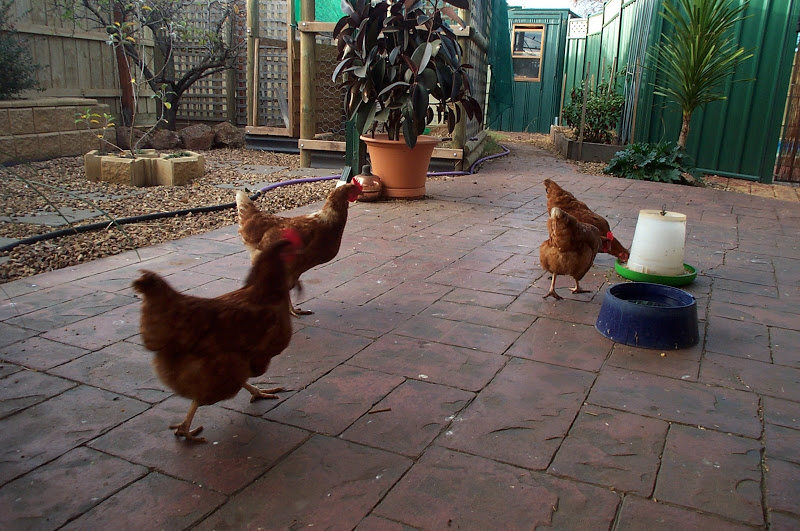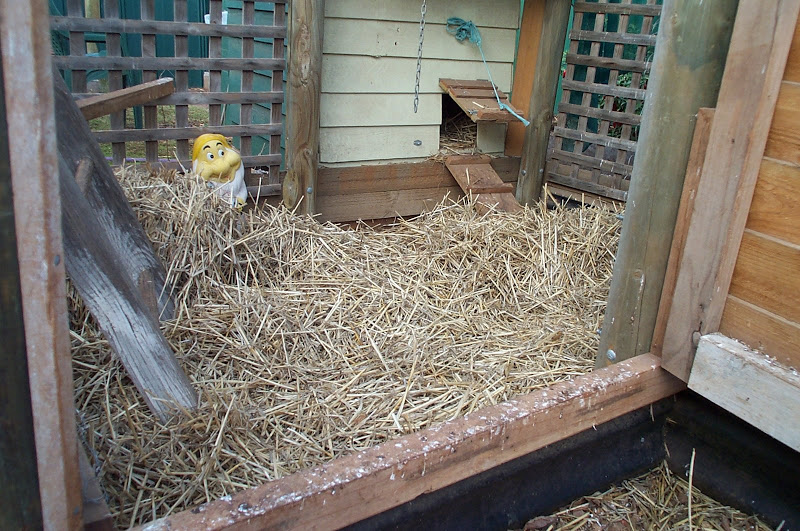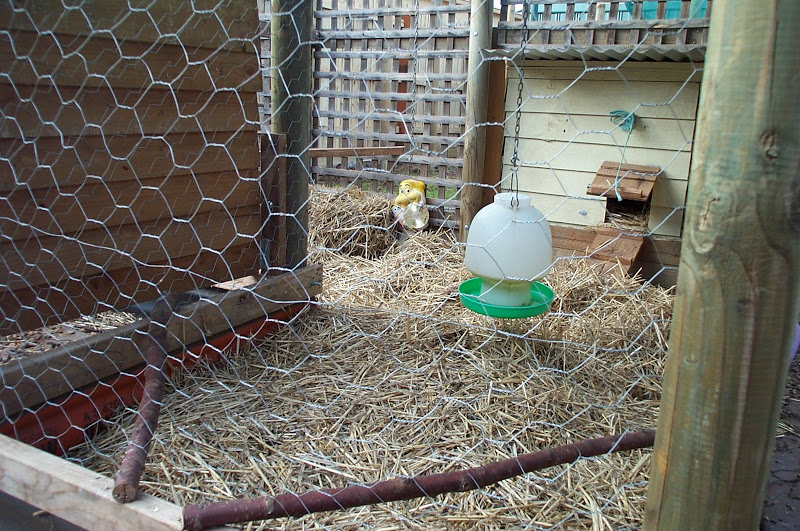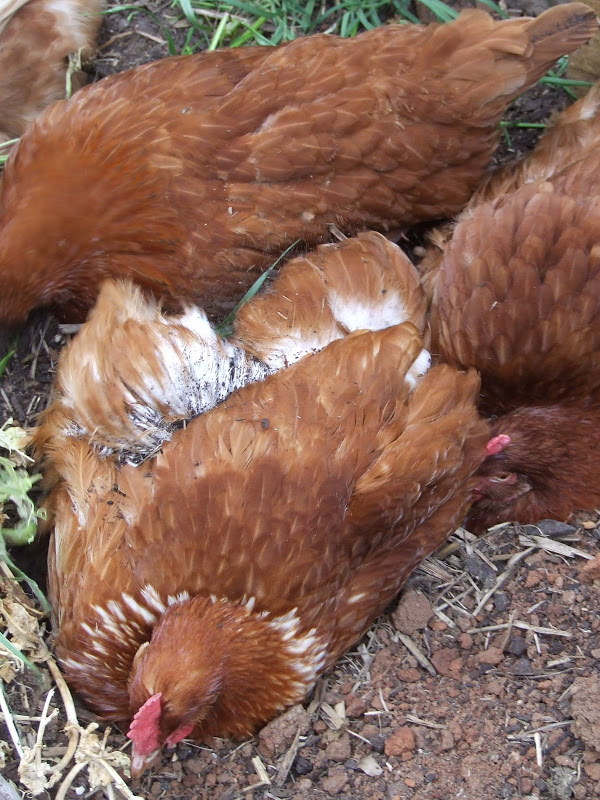How do you keep your chicken run clean? This chicken hygiene question gets asked all the time via email, or whenever I post a chicken story on my Facebook page.
Even more surprising are things that people say to me when they visit and check out Cluckingham Palace. Usually the first response is “Hey, it doesn’t smell!” Quite true, because I ensure that with regular animal husbandry, they keep clean (but not tidy).
The tips below are some of the things I have learnt in since we have had our own hens and are only learnings from September 2008 until now.
I find that chicken hygiene is quite simple to keep on top of. All you have to do is ensure that their run and house don’t get very messy and that you use a bit of preventative medicine to help them along. It only take a little of your time to make sure your girls remain healthy and strong.
I use a deep litter methodology in my chook run. Every 2 weeks to a month, and more often if it has been raining heavily, I clean out the litter from their house and either compost it, bag it up for later, or throw it into a resting garden bed to improve the soil. This takes me about 45 – 60 minutes simply because there is a lot of it. Then I spread a few handfuls of dolomite lime on the ground to stop acid build up and to sweeten the soil. I find this necessary to stop the build up of earth borne pests from getting hold in their permanently fixed run.
After everything is limed, I get a bale of straw (not hay, too many moulds/pollen that may make them sick) and spread about half of it all over the bottom of the run. Now because they only have a small run this makes the depth of the straw about 30cm (1 ft) deep.
The chickens are very funny when they go back into their run after you have cleaned it out. Because the new straw is so spongy, they tread very lightly until they get used to is again. Here are a couple of views of the run showing the depth of the straw which I changed out last weekend.
The other half bale in the corner is used during the month to replace the bedding in their house every week. Because they defecate quite a bit when roosting at night, I find that a weekly clean out keeps their house from getting smelly and deters mites and lice from setting up camp.
Don’t forget to make sure there is clean water available each day. This is essential in their digestion and helps them to break up their food. They are just like us, water is a necessity. If they don’t have enough available, you many find they develop digestion problems and food will begin to get stuck in their crop (first stomach).
Also don’t forget to give them some shell grit. This also helps them break up their food in the crop and adds necessary calcium for egg-shell development. If they do not have enough calcium in their diet, their bodies draw it from their bones, which may lead to other problems later on.
The other things I do is let them free range each day for most of the day. They have a very small row of grass (next to the run) that they mow for me, and a couple of garden beds that they like to dust bath in. By dust bathing daily the chickens manage well in keeping any mites or lice at bay.
I also add a teaspoon of crushed garlic to their water once a fortnight, which is also a bug deterrent. Another thing that helps with intestinal worms is nasturtiums. I offer them some of the leaves, sometimes they eat a bit, some times they don’t. I leave the choice up to them.
They are very clean girls, and usually preen themselves after their dust bath. They take the oils from around their tail feather area with their beaks and rub it on the base of their other feathers. It is very interesting to watch their behaviours, and it is a relaxing pass time.
The main thing is to keep the area that they live in clean. This will minimise any potential health problems right from the start. An ounce of prevention is always worth more than a pound of cure.
If you have any poultry hygiene tips of your own, I would love to hear from you via a comment. The more the merrier. Anything to help keep these wonderful additions to a permaculture garden fit and healthy!
If I have whet your appetite and curiosity with this post, check out my eBook on the subject of chickens titled “Way of The Chicken – A Guide to Keeping Backyard Chickens”.
You can find this book in my eBookstore.





Some great hints thanks. I look after my chook pen in a very similar way (although i must admit I am a little slacker than you with changing the straw under their roost).
I use a chicken tractor which means I don’t change the straw in their run. I just add to it every few weeks. It gets thicker and thicker. The worms move into the lower layers and it composts nicely so that when I move the tractor on – the garden bed is ready for planting.
I was interested in your comment re using straw instead of Hay because of the mould and pollen making the chooks sick. Have you experienced this or read about this risk any where? I’m keen for more information as I use spoilt hay because it is far cheaper than straw – but i have noticed the mould and was wondering whether is was not good for them???
Cheers,
Tricia
Hi Gavin, We give our chooks some chives every now and then to deter intestinal worms, chopped up very small so that they dont bind up in their crops. This was told to me by a poultry breeder who has been in the business of raising and judging poultry at country shows for many years.
@ Tricia. I did read about the straw vs. hay in a book, but can’t for the life of me remember which one. I think it was mainly to do with respiration problems. I haven’t had any experience with the condition, as I use straw and I have never seen any mould.
@ Olive. That is a great tip, I will go and see if they will eat some now. Probably similar to garlic with the chives having trace amounts of sulphur which will keep the intestinal worms away.
I use a mobile coop and tractor too. These get moved each morning, so there is no chance for their poop to build up in any one place. It distributes the nitrogen all around our property too.
Soon I will “park” them on a patch of turf that I want to destroy in preparation for situating a coldframe there in a few months. It should take them about a week to destroy the grass down to the roots. Then I will throw in material from our compost pile each day for a few days. They’ll break that down for me, and work it into the soil. After that I’ll sheet mulch and leave it all to rest for a month or two before filling the coldframe with more soil and then planting.
Kate, that is a good method of utilising the chook’s unique talents for ripping up everything. Unfortunately, I have little lawn left and what remains is the area they free range in.
Gav
Gavin, I tractor my vegie patch much as in Linda Woodrow’s book, The Permaculture Home Garden. Margaret might find it helps to ensure that the opening to the feed container is level with the smallest chook’s back — stops them scattering so much food. I force-feed mine garlic from time to time to keep them healthy and make sure they have some green pick each day if they are corralled. As long as they have soft material underfoot to scratch in, they shoudl be pretty clean. Oh, and don’t overfeed them fruit — they like it, but it can give them the runs!
Wow, thanks everyone for the wonderful information! I was looking for a remedy for the lice on my chickies and am delighted to have found wonderful pro-permaculture approaches. Thank you to the whole community for all your contributions, it makes all the difference! WendyB, Laingsburg, RSA
The only thing I do differently is use sugar cane mulch instead of straw. If you picture the cross section of a piece of straw it provides a perfect little house for mites, because sugar cane mulch is split they find it much harder to set up home!
Hi Louise. I have also moved to sugar cane mulch for the same reason (this post was written way back in 2009).
Gav